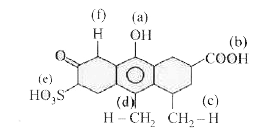In compounds of type , where , As or , the angles for different are in the order
B gt P = As = Bi
B gt P gt As gt Bi
B lt P = As = Bi
B lt P lt As lt Bi
The correct Answer is:B
Step by step video, text & image solution for In compounds of type ECI_(3), where E=BP, As or B, the angles CI-E-CI for different E are in the order by Chemistry experts to help you in doubts & scoring excellent marks in Class 12 exams.
Updated on:21/07/2023Topper's Solved these Questions
- CHEMICAL BONDING Book:MOTIONChapter:CHEMICAL BONDING Exercise:EXERCISE -4 LEVEL-I
Explore 39 Videos
- CHEMICAL BONDING Book:MOTIONChapter:CHEMICAL BONDING Exercise:EXERCISE -4 LEVEL-II
Explore 40 Videos
- CHEMICAL BONDING Book:MOTIONChapter:CHEMICAL BONDING Exercise:EXERCISE -2 LEVEL II
Explore 71 Videos
- CARBOXYLIC ACIDBook:MOTIONChapter:CARBOXYLIC ACIDExercise:Exercise - 4 (LEVEL - 2 )
Explore 22 Videos
- CHEMICAL EQUILIBRIUMBook:MOTIONChapter:CHEMICAL EQUILIBRIUMExercise:Exercise - 4
Explore 20 Videos
Similar Questions
If A, B, C are the angles of a triangle and eiA,eiB,eiC are in A.P. Then the triangle must be
View SolutionIf A, B, C, D are numbers in increasing order and D, B E are numbers in decreasing order , then which one of the following sequences need neither be in a decreasing nor in an increasing order? E, C, D (b) E, B , C (c) D, B, A (d) A, E ,C
View Solution
Knowledge Check
In compounds of type ECl3, where E=B, P, As or Bi, the angles Cl-E-Cl for different E are in the order.
AB>P=As=BiBB>P>As>BiCB<P=As=BiDB<P<As<BiGiven that eiA,eiB,eiC are in A.P., where A, B, C are angles of a triangle then the triangle is
AisoscelesBequilateralCright angledDnoneYou are given two compound

First, you name both of them the same yet, are they really same structure, or they some how different ?Carefully inspection should convince you that they are indeed different. Now, how their physical and chemical properties differ? Generally
(i) cis-isomer has more diplomoment than trans-isomer
(ii) cis-is less stable than trans
(iii) boiling points of cis isomers are than those of trans isomers (remember boiling points are directly related to polarity which is determined by dipolemoment) chemical reactivities of cis and trans also differ from each other.
Arrange the following compounds in the increasing order of the boiling poiints
CH3−CAH=CH−CH3(cis),CH3−CBH=CH−CH3(trans)
CH3−CCHCl=CH(cis),CH3−CDH=CHCl(trans)AB<A<C<DBD<B<A<CCB<A<D<CDC<A<B<D
Each Me/H, 1,3-diaxial interaction imparts 3.75 kJ mol−1 and each Me/Me, 1,3-diaxial interation imparts 15 kJ mol−1 of instability to a compound. Find the energy differences between the more stable conformers of
a. Cis - and trans-1,3-dimethyl cyclohexane.
b. (e,e) and (a,a) trans-1,2-dimethyl cyclohexane.
c. cis- and trans-1,1,3,5-tetramethyl cyclohexane.
View SolutionWhich of the following combination of axial & equitorial bonds show Cis or Trans orientation in Dimethyl cyclohexane.
(i) 1e, 2e (ii) 1e, 3e (iii) 1e, 4e (iv) 1e, 2a (v) 1e, 3a (vi) 1e, 4a (vii) 1a, 3a
View SolutionStatement-1 : If eiθ=cosθ+isinθ and the value of eiA.eiB.eiC is equal to -1, where A,B,C are the angles of a triangle.
and
Statement -2 : In any △ABC,A+B+C=180∘
View SolutionArrange 'a' to 'e' types of H atoms in increasing acidic order.

View SolutionIf the difference between the CI and Si on some amount is 28 then find the difference between CI and SI on same amount at same rate of interest if interest is compounded half yearly?
View Solution

